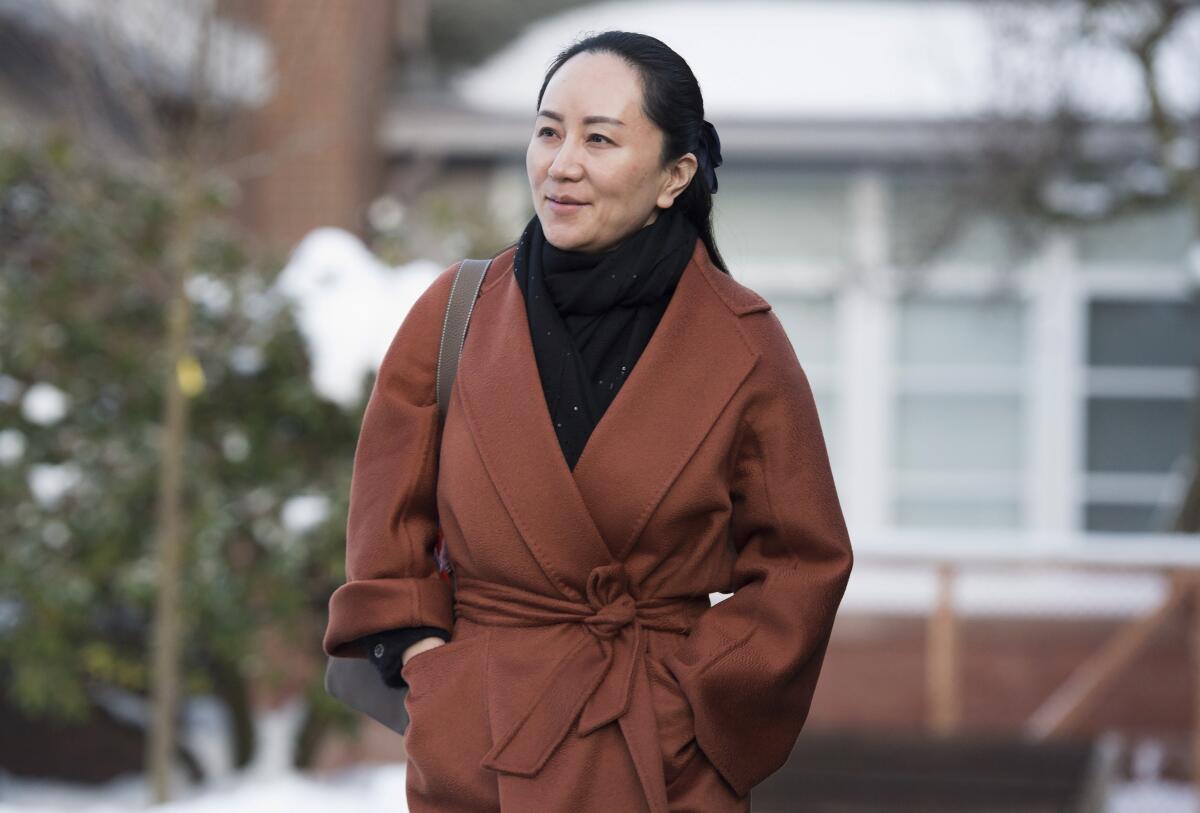Huawei’s chief financial officer loses bid in Canada to end U.S. extradition fight

- Share via
Huawei Technologies Co. Chief Financial Officer Meng Wanzhou failed to persuade a Canadian judge to end extradition proceedings, keeping her under house arrest in Vancouver as she fights U.S. efforts to prosecute her on fraud charges.
The ruling marks an early victory for U.S. authorities but is already further straining relations between Canada and China. A Chinese Embassy representative in Ottawa on Wednesday called the case “a grave political incident” and urged Canada to let Meng return to China. Two Canadians, detained within days of Meng’s arrest in December 2018, also remain jailed in China.
Meng, the eldest daughter of Huawei’s billionaire founder Ren Zhengfei, has emerged as the highest-profile target of a broader U.S. effort to contain China and its largest technology company, which Washington sees as a national security threat. The Justice Department charged her with conspiring to defraud banks by tricking them into conducting transactions that violated U.S. restrictions on selling technology to Iran.
Associate Chief Justice Heather Holmes of the British Columbia Supreme Court on Wednesday dismissed Meng’s request to throw out the case, ruling that it meets a key test of Canada’s extradition law known as double criminality — or whether the alleged crime in the U.S. would also be a crime in Canada.
Meng, 48, appeared in court Wednesday, dressed in black and wearing a face mask. She had argued that the U.S. was disguising its allegation of sanctions violations as a fraud charge in order to get around the double-criminality rule. Had they taken place in Canada, the banking transactions at issue wouldn’t have violated any Canadian laws, they said.
Holmes rejected the argument, saying fraud can be prosecuted in Canada if a U.S. bank was put at economic risk for violating U.S. sanctions.
Meng’s approach “would seriously limit Canada’s ability to fulfill its international obligations in the extradition context for fraud ... ” Holmes wrote. “For the double-criminality principle to be applied in the manner Ms. Meng suggests would give fraud an artificially narrow scope in the extradition context.”
The judge’s decision helps clarify an issue that’s been in the spotlight in Canada because of the Huawei litigation, said Brian Heller, a criminal defense lawyer not involved in the case.
”There was a strong argument to be made by both sides,” Heller said. “It wasn’t a slam dunk. This has been the subject of a lot of analysis and it was a very, very important argument to bring forward.”
The U.S. welcomed Holmes’ decision. “The United States thanks the government of Canada for its continued assistance pursuant to the U.S./Canada Extradition Treaty in this ongoing matter,” a spokesman for the Justice Department said.
Huawei said in a statement posted on Twitter that it continues to stand with Meng in her pursuit of justice and freedom. It said it expects Canada’s judicial system will prove Meng’s innocence.
The judge’s ruling doesn’t end Meng’s battle against extradition.
She also claims there was an abuse of process when she was arrested in 2018 and has sought additional details from the Canadian government, police and border officials on the circumstances of her detention. The Canadian government claims some documents related to the case are privileged and she can’t see them. Her lawyers plan to challenge those claims.
After issuing her decision, Holmes canceled hearings that were scheduled for June and will announce a new timetable next week.
Meng faces tough odds. Of the 798 U.S. extradition requests received since 2008, Canada has refused or discharged only eight cases, or 1%, according to the country’s Department of Justice.
The case was triggered when Meng was arrested on a U.S. extradition request during a routine stopover at the Vancouver airport. She owns two homes and has often spent summer holidays in the city.
The U.S. is attempting “to bring down Huawei and other Chinese high-tech companies, and Canada has been acting in the process as an accomplice of the United States,” the Chinese Embassy representative said Wednesday. Canada should “not to go further down the wrong path,” the representative said.
In the weeks after her arrest, China arrested two Canadians, halted billions of dollars in Canadian imports and put two other Canadians on death row, plunging China-Canada relations into their darkest period in decades.
Securing the release of the two men remains Canada’s priority, Foreign Affairs Minister François-Philippe Champagne said in a statement.
“We will continue to pursue principled engagement with China to address our bilateral differences and to cooperate in areas of mutual interest,” Champagne said.
Canadian Prime Minister Justin Trudeau — caught between his country’s two biggest trading partners — has resisted attempts to persuade him to interfere, saying the rule of law will govern Meng’s case.
Heller said Holmes’ decision Wednesday appeared to bear that out. “It is another example of our judiciary acting independently and what strikes me as remarkable is China’s apparent belief that, acting as it has, it could somehow influence that outcome,” Heller said.
The pursuit of Meng by U.S. authorities predates the Trump administration: officials had been building a case against her since at least 2013, three years before Trump was elected president.
The U.S. claims Meng lied to banks including HSBC Holdings and tricked them into processing more than $100 million in transactions through the U.S. in breach of sanctions.
Patricia Hurtado, Danielle Bochove and Kait Bolongaro contributed to this report.
More to Read
Inside the business of entertainment
The Wide Shot brings you news, analysis and insights on everything from streaming wars to production — and what it all means for the future.
You may occasionally receive promotional content from the Los Angeles Times.










